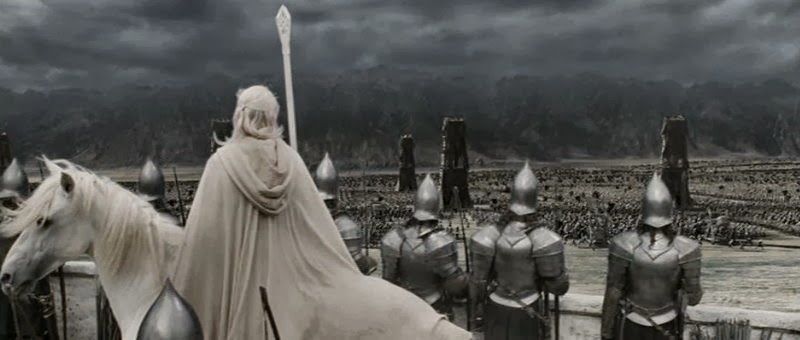1. Don't be an asshole.
 |
| Dat lustrous glow. |
It's funny how power messes with people's heads, even when the power is just over a fictional country. They might seem nice, then all of a sudden they're like Bilbo Baggins flipping his shit when Frodo shows him the ring. Even though you can pretend you are Putin and that you can kill twenty polar bears by flexing your left pectoral, you will quickly find out that Putins, even simulated ones, don't make many friends. And in order to do well you're going to need all the friends you can get when some rampaging imperialist comes along and decides that he can turn the international community against you and justify an invasion.
Everyone's looking for a reason to expand; don't give them the opportunity to do so in the name of justice.
2. Remember that in Statecraft, self-interest necessitates cooperation
 |
| And my axe! |
You want to win. Everyone wants to win. You can't do that alone, or without working closely with other countries to build that international system. Although you have your own objectives, you will often be reliant on others to help you achieve those goals, especially for things like self-defense. The international system has to be built on trust; without it, your country is friendless and hopeless.
In order for your country to succeed, the international system must also succeed. The only exception is when one conqueror takes over the world, but Statecraft is not Middle-Earth. Global domination is not a viable strategy going into the game. You should try to build trust with any and all countries, and cut off any who commit actions that make them untrustworthy. A country without integrity will not survive.
3. Socialize with your government and other governments.
 |
| Your problem, Gandalf, is that you're insufficiently white. |
Get to know your group, your allies and your competitors quickly. You will be spending a lot of time with your group outside of class, so you should all try to feel comfortable talking to each other. It makes policy discussions more fruitful. Find and locate allies whose help will be mutually beneficial. Start paving the way for non-aggression pacts by exchanging embassies. Try to establish embassies with as many people as possible initially to determine what their grand strategy is. If you decide you don't like their grand strategy, close the embassy and look elsewhere for friends. If they seem cooperative, establish a non-aggression pact.
Avoid alienating groups simply because they have gone the route of communist totalitarian or dictatorship, as such nations will be invaluable if diplomacy starts turning ugly. Do not, under any circumstances, practice isolationism; it hurts your score along with everyone else's. Channel your role-playing abilities from DnD and actively participate in international organizations.
4. Plan your actions well in advance.
 |
| "No army has ever breached the deeping wall or set foot inside the Hornburg." - Théoden |
Make end-game plans immediately to ensure you are focused on the win condition and nothing else. Aim for the Global Goals first, then Country Development Goals, then Competitive Country Goals. Establish what Big Projects and technologies you want to build and research, respectively, and ensure that your goals are distinct from that of your allies. Remember, your goal is to end up with a high score, not to "win" in the traditional sense of a real-time strategy game. Treat this more like a duller version of Sid Meier's Civilization and try to avoid killing anyone unless you can guarantee victory by the end of the simulation. Though things will not always go exactly as planned, you should still make every action with your "grand strategy" in mind.
5. Locate potential threats and gauge how dangerous they are.
 |
| Video-conferencing never really caught on in Middle Earth. |
There will be groups that are more reluctant to cooperate with you, perhaps due to paranoia or perhaps they have plans for a separate alliance. Or perhaps they simply think they have enough friends and they won't really benefit from the relationship. Either way, you should keep a watch list on such countries and commission a communist totalitarian friend to conduct some espionage or bribe their ally for info.
If they're building up an army and they do not have a good reason for it, you have to report them to the UN while also building up your own military in case they go for a pre-emptive strike, especially if they share a border with you. The size of army you build should depend on how much you trust the UN to come to your aid in time. But most importantly, never forget the diplomatic route; it always has priority. Don't let your itchy trigger finger get the best of you. This is where you light the beacons and call a military dictatorship ally to your aid.
6. Maintain a small militia at all times.
 |
| Giant statues are also a worthwhile defensive investment. |
A cheap security measure will go a long way towards deterrent. There is no need to spend excessively on armies; that will make everyone upset. Claiming that an OP army full of tanks, bombers and battleships is necessary for "national security" is an obvious bullshit and no one will buy it. Instead, you will receive some friendly condemnations from the UN and then you will take it in the ass from every other country that wants your head on a spike.
There is, of course, no need for nukes. Doing so greatly upsets the international system and promotes fear and brinksmanship, which is bad for politics and your country's survival. Since your job is to cultivate an international system, not destroy it, nukes are counter-productive.
Defensive structures are far stronger than offensive structures so invest in those and combine them with a skeleton crew of troops to maximize effectiveness. Especially pacifists. Reinforce your defences as soon as you become aware of a country building up fire power but first seek a diplomatic solution (because you're not an asshole and wouldn't engage in a preventive war or something silly like that without UN authorization now would you?).
7. Warfare is a last resort, and should be when all diplomatic avenues have been exhausted.
 |
| We're fucked. - Gandalf, The Return of the King |
Bloodlust will lead you to your demise. There are no "glorious" wars for honor or for freedom. There are no points for "most countries conquered" or "enemy units destroyed", so engaging in war is purely out of selfish greed and indicates that that country is a toxic member of the international system and must be removed. Worse, any war will take 5 points away from everyone because they lose the Global Peace Award. So if you're going to go to war, prepare for a lot of angry countries at your doorstep.
If you really, really have to fight and work off your excess testosterone, wait until after the Ice Mountain issue is resolved, because that thing is a huge pain in the ass if you let it snowball (pun intended) out of control. With that taken care of, you'll have more resources to devote to building armies.
Conflicts are not solved by building up armies and building alliances, however. That merely escalates tensions. Make arrangements for both of you to create a disarmament pact to avoid any spark lighting the powder keg.
8. Big Projects are important, but not your main goal.
 |
| When you're not sure how to properly counter an overwhelming force, charge straight at them. |
It's easy to get excited by the huge benefits presented by grabbing Big Projects left and right. In reality only the primary economic powers will be in any condition to bid for them, while other states will suck their resources dry in the process. Don't build a whole strategy around Big Projects, because you're probably not going to successfully acquire more than two of them. Your strategy should be based on your economy, your domestic factions, your allies and your enemies.
8. Deal with Global Issues before they fuck everyone over.
 |
| Mordor was responsible for 90% of all harmful emissions during the Third Age. |
Typhoon Pirates? Ensure that their host countries wipe them out as fast as possible. Ice Mountain? Be a hero, build that Globe of Frost. Orion Slavery Dispute? Free the slaves and return them to their rightful home. Sapphire Island? Don't touch unless you have an overwhelming number of countries supporting you or you have sufficient counter-terrorist forces at your disposal to deal with the Sword of the Amaru. Those guys are a bitch to clean up though, so seriously folks, leave the island alone.
Easier said than done, but in order to deal with these goals the UN needs to be active or else it's useless. People know that the UN should be kept alive, but sometimes they need to be reminded. Make sure you're vocal about it.
9. Play to your country's strengths.
 |
| A dead tree is not the most threatening national symbol you could choose. |
Don't try to be a jack-of-all-trades; you have allies to make up for your resource deficiencies. If you're a democracy, focus on research and education stuff and try to get that number as high as possible. For constitutional monarchies, do the same with culture. Trying to balance out all your stats will merely make you sub-par compared to everyone else. If you're a leader in producing a lot of something, you have more influence over your allies as they see you as an asset. If you're communist totalitarian or a dictatorship, you're definitely going to need to make friends with the other government types quickly or else you will fall behind economically.
10. The Manual will tell you everything, and it will tell you nothing.
 |
| The one thing you don't want to be doing with the manual is going There and Back Again. |
Statecraft is about learning through trial and error, not about believing in words on a page, whether they're from Kenneth Waltz, Woodrow Wilson or Alexander Wendt. It's one thing to read their ideas, and quite another to see them in real life.
Let other countries make the errors, and learn from them. Then proceed to make the right choices. Be as diplomatic as you can, make decisions slowly and only after careful calculation. Pay attention to the news feed. Make sure you're following on all the things happening, even if it is a lot of information. If you fail to notice key bits of info and take them into account before a turn ends, they will come back to bite you in the ass down the line.











Thanks a lot. Helping.
ReplyDeleteWhat happens when ice mountain strikes? we are at the 2nd turn of flooding and were losing 50% of our base resources already, what is the most harm that can come to us and what goes on until then?
ReplyDeleteThis comment has been removed by the author.
ReplyDeleteshould i be communist ??
ReplyDelete